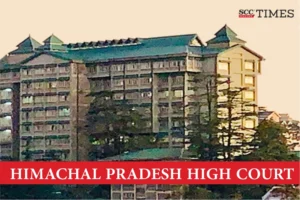Himachal Pradesh High Court: In an income tax appeal and a civil writ petition filed by the petitioner/ assessee against the order of the Commissioner of Income Tax (Appeals)(‘CIT’) whereby the petitioner’s appeal was rejected and the best judgment assessment framed by the respondent 5, i.e., Income Tax Officer, Himachal Pradesh (‘ITO Himachal’), the Division Bench of Tarlok Singh Chauhan* and Rakesh Kainthla, JJ., allowed the income tax appeal as well as the writ petition holding that the respondents did not comply with the procedure laid down in Section 127 of the Income Tax Act, 1961(‘the Act’) in transferring the petitioner’s case from Delhi to Himachal Pradesh.
Background
In 1997, the assessee established his partnership firm Deluxe Enterprises in Delhi. In 1999, he established a manufacturing unit in Himachal Pradesh.
The assessee filed his income tax returns(‘returns’) since the inception in Delhi with respondent 4, i.e., Assistant Commissioner of Income Tax Circle, New Delhi (‘ITO Delhi’). In 2010, ITO Himachal issued notices under Section 143 (2) and 142(1) of the Act, initiating proceedings under Section 144 for the assessment year 2009-2010.
Aggrieved, the assessee filed an appeal before the CIT, Shimla, which was rejected. Thereafter, he preferred a second appeal before the Income Tax Appellate Tribunal, Chandigarh, against the order of the CIT. However, this appeal was also rejected. Hence, the present appeal was filed.
Analysis and Decision
The Court noted that the assessee filed his returns with ITO Delhi since inception. Hence, the assessee’s returns, which were originally with ITO Delhi, could not have been unilaterally transferred to ITO Himachal without complying with the provisions of Section 127 of the Act.
The Court stated that the twin conditions that had to be complied with by the respondents for transferring the assessee’s case were:
-
the assessee must be given a reasonable opportunity of being heard, and
-
the reasons for the transfer must be recorded.
The Court noted that, admittedly, the said procedure was not complied with. The explanation of the respondents that Section 127 was not attracted to the present case as it was only the ITO Himachal who had the authority to issue notices under Section 143(2) read with Section 142 (1) of the Act was deemed untenable by the Court.
The Court stated that the reasoning virtually amounted to putting the cart before the horse and being a judge in one’s cause. Raising a question and then answering it themselves was not sufficient ground to conclude that Section 127 was not attracted in the present case. The Court further stated that the issue had to be decided by taking recourse to Section 127 of the Act and not otherwise.
The Court noted that it was undisputed that in the present case, the assessing officer was changed and records were transferred to him, which could have only been done after compliance with Section 127 and an order passed in the absence of any reasons for transfer had to be construed as having been passed without application of mind. In this regard, the Court referred to Anand Chauhan v. Income Tax 2014 SCC OnLine HP 5278, where an identical issue had come up before the Court. The Court in the captioned case held that furnishing specific and intelligible reasons for the proposed transfer of the case is only a concomitant of the concept of reasonable opportunity enshrined in Sections 127 (1) and (2). Unless the assessee knows the precise reasons for the transfer, he would be handicapped in putting forth his objections effectively, and in case the transfer of the case is based on extraneous considerations, then issuance of show cause notice becomes meaningless and is reduced to an idle formality.
The Court held that a valuable right of the assessee was involved in the matter because when he objected to the jurisdiction of the assessing officer and transfer of his case, it could not have been adjudicated upon without affording him an opportunity of being heard and disclosing to him the reasons for not accepting his point of view.
Thus, the Court allowed the appeal as well as the writ petitions and set aside the impugned orders framing the best judgment assessment for the respective assessment years. However, the Court clarified that this judgment would not prevent the respondents from initiating proceedings afresh by resorting to Section 127 of the Act or initiating/ continuing the proceedings through ITO Delhi.
[Deluxe Enterprises v. Income Tax Officer, 2025 SCC OnLine HP 44, decided on 02-01-2025]
*Judgment authored by Justice Tarlok Singh Chauhan
Advocates who appeared in this case:
For the respondent: Dy. SGI Balram Sharma, Rajiv Sharma, Ishan Kashyap

